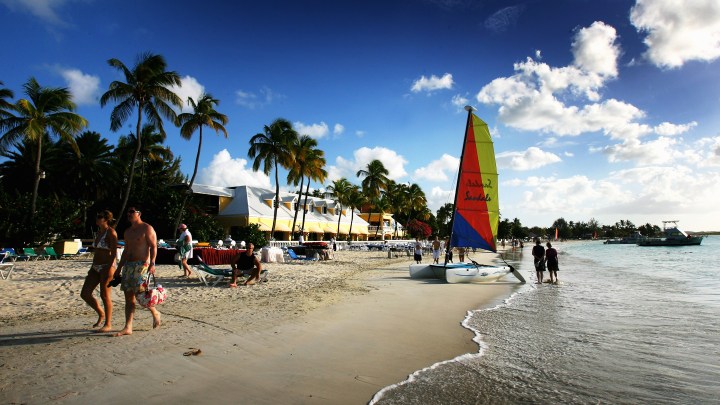
How do all-inclusive resorts make money?

This is just one of the stories from our “I’ve Always Wondered” series, where we tackle all of your questions about the world of business, no matter how big or small. Ever wondered if recycling is worth it? Or how store brands stack up against name brands? Check out more from the series here.
Listener Rigoberto Gallardo asked Marketplace this question:
What makes all-inclusive resorts profitable, and why don’t I find any in the U.S.?
It does seem counter-intuitive that offering a flight, hotel, unlimited food and drink, and activities all for one fixed price would be a good business model. But the all-inclusive resort model is growing among hotel developers, according to Ari Ginsberg, professor of entrepreneurship and management at NYU’s Stern School of Business. So the model clearly turns a nice profit.
The all-inclusive model makes money for a couple of reasons. Ginsberg explained that the resorts solve the “hold-up problem” for customers. The hold-up problem is a broader economic theory, but in this case, it basically means that because the resort and the customer are agreeing to a set cost for everything up front, both parties benefit.
“[The resort] says to the customer, ‘Look, you don’t have to worry about being held up by these other costs, because we’re going to tell you in advance. This is how much it’s gonna cost you. It’s gonna include breakfast, dinner, access to the spa, access to the pool — all the amenities,’” Ginsberg said. “And by doing that, they are basically dealing with your hold-up problem.”
Now, this also benefits the resort, because instead of just getting the money the customer would spend on a room, it also gets the money the customer would have spent elsewhere on food, drinks and activities. “They’re getting a larger percentage of total guest value,” Ginsberg said.
And because the resorts know in advance that the customer will be spending all their time on-property, the resorts can operate more efficiently, in terms of cost. They control more variables of the economic equation. For example, they’ll know how much food to order for on-property restaurants. If they invest in a facility, like a spa, they’ll know at which point they’ll break even on it, and “they can figure out how to charge something that is cheap enough for the customer, but they’re still making a profit on it,” Ginsberg said.
Another component of profitability is that “the low utilizers subsidize the high utilizers,” said Bob Batt, associate professor of operations and information management at the Wisconsin School of Business.
“If you have one glass of wine and I drink five glasses of wine at dinner each night, even though they may be losing money on me, they’re making money on you,” he said. “And on average, it’s got to balance out.”
While there actually are some all-inclusive resorts in the United States, they are definitely concentrated in Mexico and the Caribbean. One reason, according to Ginsberg, has to again do with the hold-up problem. In this case, picking a location far from competition creates another hold-up problem for the vacationer. If the resort is far away from other bars, restaurants, shops and activities, it makes more sense to invest in the all-inclusive model.
Freddy Dominguez, vice president of market management for Latin America and the Caribbean at Expedia Group, said flights also play a big factor in the location of all-inclusives. Of course, a location that has beautiful weather year-round and crystal clear blue water is preferable for a vacation spot, which makes Latin America a prime destination. But Dominguez said direct flights from the U.S. pretty much only go to the northern parts of Latin America, which is why it’s a major location for all-inclusive resorts aimed at Americans.

All-inclusive resorts can also be a detriment to the local tourism economy if they’re located close to a town, since vacationers stay on the resort property the whole time and spend all their money there. So local government regulations play a role, Ginsberg said.
Batt, at the Wisconsin School of Business, said it also has a lot to do with the way Americans think about the Caribbean and the idea of paradise.
“It’s a psychological effect. For a lot of us Americans, we see going to the Caribbean as the getaway: the turquoise waters, the lying on the beach, the big sun hat. I’m away from everything else and I put the email away. I want to have that experience of putting the wallet away and just relaxing,” he said.
“When we go far to that paradise island, that’s the mood we’re in,” Batt continued. “And maybe less so when we’re here domestically. I’m traveling to Florida, but I’m not necessarily going for that paradise vacation; I’m just going to sit on the beach for a while.”
Have a question you’ve always wondered about? Let us know using the form below.
There’s a lot happening in the world. Through it all, Marketplace is here for you.
You rely on Marketplace to break down the world’s events and tell you how it affects you in a fact-based, approachable way. We rely on your financial support to keep making that possible.
Your donation today powers the independent journalism that you rely on. For just $5/month, you can help sustain Marketplace so we can keep reporting on the things that matter to you.


















